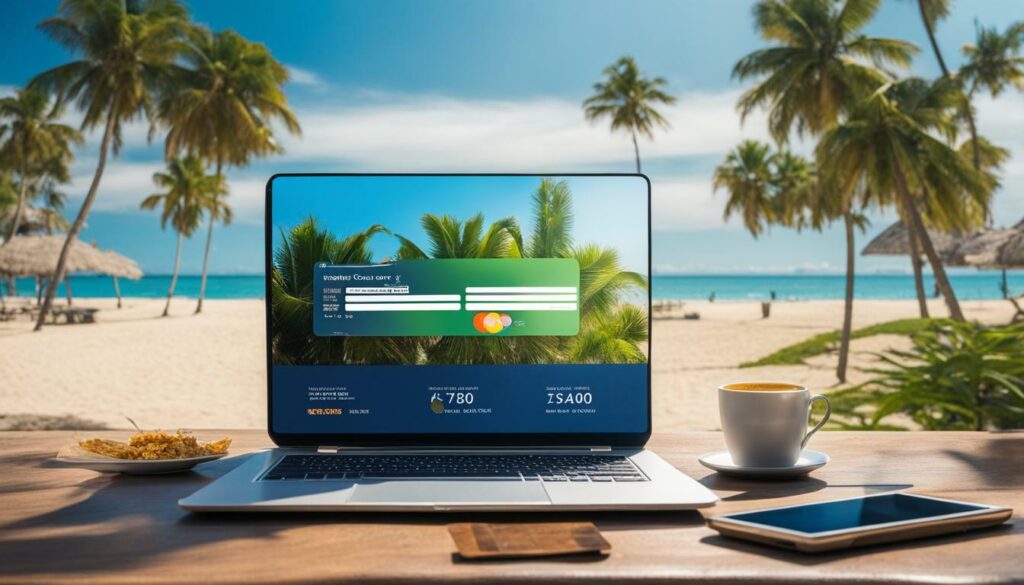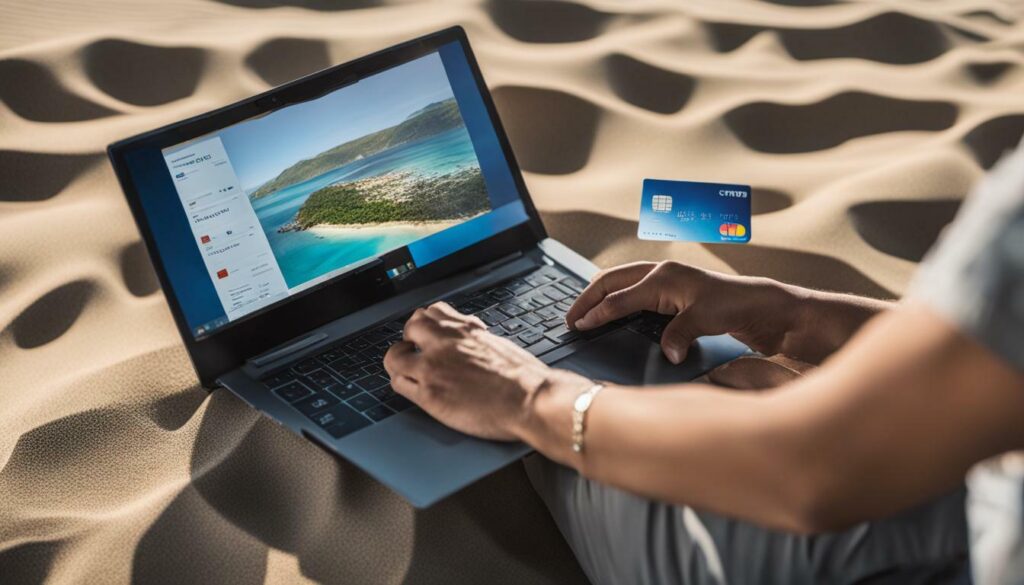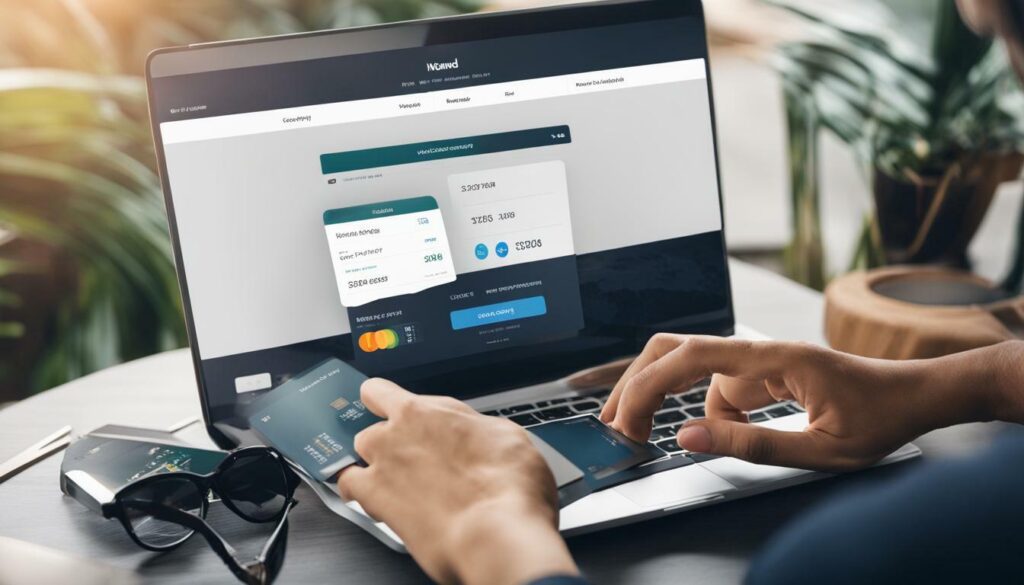Essential Credit Considerations for Digital Nomads Explained

As a digital nomad, managing your credit is crucial for financial stability and making major purchases in the future. Whether you are traveling the world or working remotely, building credit and effectively managing your finances can pose unique challenges. Here are some essential credit considerations that all digital nomads should understand:
Key Takeaways:
- Consider becoming an authorized user on someone else’s credit card to build credit.
- Start building credit by obtaining a secured credit card that requires a security deposit.
- Explore travel rewards credit cards that offer perks for frequent travelers.
- Take out a credit builder loan to establish and improve your credit history.
- Maintain good credit by staying on top of payments, keeping credit utilization low, and downgrading credit cards instead of closing them.
- Be aware of the tax implications that come with being a digital nomad and seek professional advice when needed.
By following these credit considerations and implementing effective financial management strategies, digital nomads can secure their financial future while enjoying the freedom and flexibility of their nomadic lifestyle.
Building Credit as a Digital Nomad
Building credit as a digital nomad can be challenging, but there are effective strategies you can employ. Whether you’re a seasoned nomad or just starting out on your remote work journey, here are some credit solutions for nomadic lifestyles:
- Become an authorized user: Being an authorized user on someone else’s credit card, preferably someone with a good credit history like a parent, can help build credit as long as the bills are paid on time.
- Consider a secured credit card: For those without credit, getting a secured credit card that requires a security deposit can be a good way to start building credit. Paying off the balance each month is important to avoid high interest rates.
- Get a travel rewards credit card: A travel rewards credit card can be beneficial for digital nomads who travel often. Look for cards that offer perks like lounge access, travel insurance, and no foreign transaction fees.
- Take out a loan: Taking out a small personal loan and repaying it over time can help build credit. Consider a credit builder loan that specifically helps build credit and allows for fixed monthly payments.
When it comes to maintaining good credit, it’s important for digital nomads to stay on top of payments, keep credit utilization low, and consider downgrading credit cards instead of closing them. It’s also essential to be aware of the potential tax implications that come with being a digital nomad, as different countries have different tax rules and treaties. Keeping detailed records, understanding tax residency rules, and seeking professional advice when needed can help prevent unexpected tax burdens.
🚨 TUIC Errors + Low Credit Score?
CreditScoreIQ helps you build credit faster by reporting utility bills to all 3 bureaus—while you dispute errors.
Start Building Credit Today →
Building credit as a digital nomad can open up a world of financial opportunities. With a good credit history, you can qualify for better interest rates on loans, secure housing rentals, and even negotiate lower insurance premiums. It’s an investment in your financial future that can provide long-term stability and flexibility.
| Perk | Description |
|---|---|
| Lounge Access | Access to airport lounges can provide a comfortable and productive environment for digital nomads during layovers or delays. |
| Travel Insurance | Travel rewards credit cards often offer insurance coverage for trip cancellation, lost luggage, and emergency medical expenses. |
| No Foreign Transaction Fees | By avoiding foreign transaction fees, you can save money when making purchases in different currencies. |
Being a digital nomad doesn’t mean you have to sacrifice financial stability. With the right credit strategies, you can build a solid credit history and enjoy the perks that come with it. Take control of your financial future and make credit work for you.
Managing Credit While Working Remotely
Managing your credit while working remotely is essential for maintaining a good credit score. As a digital nomad, you have unique financial considerations that require careful attention. Here are some credit tips for location independent professionals:
- Become an authorized user: Being an authorized user on someone else’s credit card, preferably someone with a good credit history like a parent, can help build credit as long as the bills are paid on time.
- Consider a secured credit card: For those without credit, getting a secured credit card that requires a security deposit can be a good way to start building credit. Paying off the balance each month is important to avoid high interest rates.
- Get a travel rewards credit card: A travel rewards credit card can be beneficial for digital nomads who travel often. Look for cards that offer perks like lounge access, travel insurance, and no foreign transaction fees.
- Take out a loan: Taking out a small personal loan and repaying it over time can help build credit. Consider a credit builder loan that specifically helps build credit and allows for fixed monthly payments.
When it comes to maintaining good credit, it’s important for digital nomads to stay on top of payments, keep credit utilization low, and consider downgrading credit cards instead of closing them. It’s also essential to be aware of the potential tax implications that come with being a digital nomad, as different countries have different tax rules and treaties. Keeping detailed records, understanding tax residency rules, and seeking professional advice when needed can help prevent unexpected tax burdens.

Managing credit while working remotely is crucial for digital nomads to maintain a good credit score. By becoming an authorized user, considering secured credit cards, and utilizing travel rewards credit cards, digital nomads can effectively build credit. Taking out a loan and repaying it over time is another strategy to establish credit history. To maintain good credit, it is important to stay on top of payments, keep credit utilization low, and downgrade credit cards instead of closing them. Finally, digital nomads must be aware of potential tax implications and seek professional advice to navigate the complex tax rules of different countries.
Credit Options for Digital Nomads
Digital nomads have specific credit options that can cater to their unique lifestyle. Whether you’re constantly on the move or working remotely from different countries, it’s important to have credit solutions that align with your nomadic lifestyle. Here are some credit options to consider:
Travel Rewards Credit Cards
Travel rewards credit cards are designed for those who love to travel. These cards offer various perks like airline miles, hotel points, and travel insurance. As a digital nomad, having a travel rewards credit card can help you save money on flights, accommodations, and other travel expenses. Look for cards that have no foreign transaction fees and provide travel benefits that suit your needs.
Credit Builder Loans
Building credit while constantly on the move can be challenging. However, credit builder loans are specifically designed for individuals who need to establish or improve their credit history. With a credit builder loan, you borrow a small amount of money and make fixed monthly payments. As you repay the loan, your credit score improves, giving you better access to credit in the future.
Secured Credit Cards
If you have limited or no credit history, a secured credit card can be a good starting point. Secured credit cards require a security deposit, which serves as collateral for the credit limit. By using a secured credit card responsibly and making on-time payments, you can demonstrate your creditworthiness and eventually qualify for unsecured credit cards.
Having access to these credit options can provide digital nomads with financial flexibility and peace of mind. However, it’s important to use credit responsibly, prioritize payments, and maintain a good credit utilization ratio. By utilizing these credit options wisely, digital nomads can build and maintain a strong credit profile while enjoying their nomadic lifestyle.
| Credit Option | Key Features |
|---|---|
| Travel Rewards Credit Cards | Airline miles, hotel points, travel insurance, no foreign transaction fees |
| Credit Builder Loans | Opportunity to establish or improve credit history, fixed monthly payments |
| Secured Credit Cards | Requires security deposit, helps build credit with responsible use |
Remember, maintaining good credit is crucial for your financial well-being. Keep track of your payments, avoid excessive debt, and consider seeking professional advice when needed. With the right credit options and responsible credit management, digital nomads can enjoy their nomadic lifestyle while securing their financial future.
Maintaining Good Credit as a Remote Worker
Maintaining good credit as a remote worker requires careful management and understanding of tax implications. As a digital nomad, you have the flexibility to work from anywhere in the world, but it’s essential to stay on top of your finances to ensure financial stability and future opportunities. Here are some key tips to help you maintain good credit while working remotely:
- Stay on top of payments: Paying your bills on time is crucial for maintaining a good credit score. Set up automatic payments or reminders to ensure you never miss a payment, especially for credit cards and loans.
- Keep credit utilization low: Aim to keep your credit utilization below 30% of your available credit limit. High credit utilization can negatively impact your credit score, so try to pay off balances in full each month or keep them as low as possible.
- Consider downgrading credit cards: Instead of closing credit card accounts, consider downgrading them to cards with no annual fees. Closing accounts can affect your credit utilization and credit history, so it’s better to keep them open with a lower credit limit if you no longer need the perks of a higher-tier card.
It’s important to be aware of the potential tax implications that come with being a digital nomad. Different countries have different tax rules and treaties, so it’s crucial to understand your tax residency status and any obligations you may have. Keeping detailed records of your income, expenses, and tax-related documents can help you navigate tax season with ease and avoid any unexpected tax burdens.

Remember, maintaining good credit as a remote worker is just as important as managing your income and expenses. By following these tips and staying proactive about your financial well-being, you can ensure a solid credit foundation and position yourself for future financial success.
| Do’s | Don’ts |
|---|---|
| Do pay your bills on time | Don’t neglect paying your bills |
| Do keep credit utilization low | Don’t max out your credit cards |
| Do consider downgrading credit cards | Don’t close credit card accounts impulsively |
| Do keep detailed records for tax purposes | Don’t ignore tax obligations |
Tax Implications for Digital Nomads
Digital nomads must be aware of the potential tax implications that come with their lifestyle. As a digital nomad, your tax obligations can vary depending on the countries you visit and the amount of time you spend in each location. It’s important to understand the tax rules and regulations of each country to avoid any unexpected tax burdens.
One key consideration for digital nomads is tax residency. Different countries have different rules about how long you can stay before being considered a resident for tax purposes. It’s important to keep track of the number of days you spend in each country to determine your tax residency status.
Seeking professional advice from a tax consultant or accountant who specializes in international tax can be invaluable for digital nomads. They can help you navigate the complexities of tax laws, identify any potential tax breaks or deductions, and ensure that you stay compliant with all tax obligations.

Remember to keep detailed records of your income, expenses, and locations visited. This will help provide evidence and support in the event of any tax audits or inquiries. Consider using online accounting software or apps to help streamline your record-keeping process and ensure accuracy.
In conclusion, managing your credit while working remotely as a digital nomad requires careful consideration of various factors, including building credit, managing credit cards, and understanding tax implications. By following these essential credit considerations and seeking professional advice when needed, you can ensure financial stability and peace of mind as you embark on your nomadic lifestyle.
Tips for Financial Stability as a Digital Nomad
Achieving financial stability as a digital nomad requires careful financial planning and credit management. To help you navigate the world of remote work and maintain a healthy financial standing, here are some credit tips for location independent professionals:
- Become an authorized user: If you don’t have credit yet, becoming an authorized user on someone else’s credit card can help you establish credit history. Choose someone with a good credit history, like a parent, and ensure that the bills are paid on time.
- Consider a secured credit card: A secured credit card can be a great option if you’re starting from scratch. By making a security deposit, you can get a credit card that will allow you to build credit. Just remember to pay off the balance in full each month to avoid high interest rates.
- Get a travel rewards credit card: As a digital nomad, you likely spend a significant amount of time traveling. Consider getting a travel rewards credit card that offers perks such as lounge access, travel insurance, and no foreign transaction fees. Choose a card that aligns with your travel preferences and financial goals.
- Take out a loan: Taking out a small personal loan and repaying it over time can help you establish and improve your credit. Look for credit builder loans that are specifically designed to assist individuals in building credit. Make sure to make your fixed monthly payments on time to show your creditworthiness.
When working remotely, it’s crucial to manage your credit effectively to maintain financial stability. Here are a few additional tips:
- Stay on top of payments: Ensure that you always pay your bills on time to avoid late fees and negative impacts on your credit score. Set up automatic payments or reminders to help you stay organized.
- Keep credit utilization low: Aim to keep your credit utilization ratio below 30%. This means using no more than 30% of your available credit. High credit utilization can negatively affect your credit score.
- Consider downgrading credit cards: Instead of closing credit cards you no longer use, consider downgrading them to avoid negatively impacting your credit history. Closing credit cards can reduce your available credit, potentially increasing your credit utilization ratio.
As you navigate the world as a digital nomad, it’s essential to be aware of the potential tax implications. Different countries have different tax rules and treaties, and understanding your tax residency status is crucial. Keep detailed records of your income and expenses, and consider seeking professional advice to ensure compliance with tax laws and prevent unexpected tax burdens.

Conclusion
Managing credit effectively as a digital nomad is crucial for long-term financial stability and the ability to make major purchases. As a digital nomad, there are several essential credit considerations to keep in mind. Building credit can be achieved by becoming an authorized user on someone else’s credit card or obtaining a secured credit card. These strategies allow you to establish and improve your credit history.
Furthermore, choosing a travel rewards credit card can provide you with additional benefits tailored to your nomadic lifestyle, such as travel insurance and no foreign transaction fees. Additionally, taking out a small personal loan or a credit builder loan can help you enhance your credit score over time.
However, maintaining good credit as a digital nomad requires diligence. It is vital to stay on top of payments, keep credit utilization low, and consider downgrading credit cards instead of closing them. Additionally, being aware of the tax implications associated with your nomadic lifestyle is essential. Different countries have varying tax rules and treaties, so it’s crucial to understand tax residency rules and consult with professionals when needed.
By implementing these credit considerations and staying informed about your financial situation, you can achieve financial stability as a digital nomad and navigate the credit landscape effectively.
FAQ
What are some credit options available to digital nomads?
Digital nomads can consider becoming an authorized user on someone else’s credit card or obtaining a secured credit card to start building credit.
How can digital nomads maintain good credit while working remotely?
To maintain good credit, digital nomads should stay on top of payments, keep credit utilization low, and consider downgrading credit cards instead of closing them.
What are some credit options specifically designed for digital nomads?
Travel rewards credit cards that offer perks like lounge access and no foreign transaction fees can be beneficial for digital nomads. They can also consider credit builder loans.
What tax implications should digital nomads be aware of?
Digital nomads need to understand that different countries have different tax rules. It is important to keep detailed records, understand tax residency rules, and seek professional advice when needed.
How can digital nomads achieve financial stability?
In addition to credit considerations, digital nomads can achieve financial stability by maintaining a good credit history, downgrading credit cards instead of closing them, and managing their finances effectively.
Ready to Improve Your Credit?
Disputing TUIC errors is step one. Step two? Boost your score by reporting utility payments with CreditScoreIQ.
Get Started Now (Only $1 Trial) →3-bureau reporting • $1M identity insurance • Dark web monitoring






